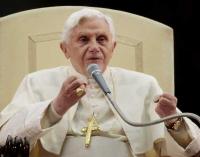By Anthony Faiola and William Wan
The Denver Post
March 26, 2010
http://www.denverpost.com/commented/ci_14760910?source=commented-
 |
| Pope Benedict XVI "is at a crossroads," says a longtime Vatican observer. (AP, Gregorio Borgia) |
ROME — An escalating scandal over clerical sexual abuse in Europe is heightening calls for greater transparency in the Vatican and a zero-tolerance policy toward abusive priests that would mirror the approach already adopted by the U.S. Catholic Church.
The Vatican is confronting what observers describe as its gravest test in years, with officials fending off allegations that Pope Benedict XVI mismanaged abuse cases that occurred years before his ascension to the papacy in 2005.
No leading Catholic authority or organization has called on Benedict to take personal responsibility for the scandals, and Vatican watchers in Rome strongly maintained Thursday that there is no serious threat to the pope's position.
Yet the scope of the abuse cases emerging in Europe, and new allegations this week that a Vatican office led by Benedict — then Cardinal Joseph Ratzinger — failed to defrock an American priest who allegedly had molested as many as 200 deaf boys in Wisconsin, have once again shed a spotlight on Vatican secrecy over such sensitive issues as church finances and abuse cases.
"The pope is at a crossroads," said Marco Politi, papal biographer and longtime Vatican watcher. "He now has to choose whether to move ahead with a clear policy of transparency or whether he will try to limit a tough line and a process of more openness on this matter in the church."
In a scandal in which the crimes often go back decades and have surfaced in different countries at various times during the past decade, the Vatican appears to be reeling over the pace of the current chapter in Europe.
On Jan. 28, the German weekly Der Spiegel reported allegations that two priests abused several students in the 1970s and 1980s at an elite Jesuit high school in Berlin. In the ensuing weeks, more than 300 alleged victims have come forward, with hundreds more surfacing in Austria, the Netherlands and Switzerland.
Last year, two government reports were released in Ireland detailing thousands of cases of sexual and physical abuse at the hands of Irish clergy from 1930 to 1990.
Officials across Europe are calling for the adoption of zero-tolerance policies, such as those enacted in the United States after thousands of abuse cases emerged there. They are also calling for the Vatican to open the files on more than 3,000 abuse cases that have gone before a powerful church office between 2001 and 2010.
The scandal in Europe has the added dimension of raising questions about the response to abuse allegations by a bishop who went on to become pope.
In Germany, a priest and accused sex offender sent to therapy in 1980 on orders approved by Ratzinger, then the archbishop of Munich, was later returned to religious duties, where he reportedly molested more children. The Vatican has said that Ratzinger was not aware that the priest was returned to pastoral duties.
But on Thursday, The New York Times reported that Ratzinger was kept more closely apprised of the case than previous church statements have suggested. The Times reported that he was copied on a memo that informed him that a priest, whom he had approved sending to therapy in 1980 to overcome pedophilia, would be returned to pastoral work within days of beginning psychiatric treatment.
An initial statement on the matter issued earlier this month by the Archdiocese of Munich and Freising placed full responsibility for the decision to allow the priest to resume his duties on Ratzinger's deputy, the Rev. Gerhard Gruber. But the memo, whose existence was confirmed by two church officials, shows that the future pope not only led a meeting on Jan. 15, 1980, approving the transfer of the priest but was also kept informed about the priest's reassignment.
Church officials defend Benedict by saying the memo was routine and was "unlikely to have landed on the archbishop's desk," according to the Rev. Lorenz Wolf, judicial vicar at the Munich Archdiocese. But Wolf said he could not rule out that Ratzinger had read it.
Late Wednesday, the Vatican came under more fire after a New York Times article detailed the case of a priest accused of molesting as many as 200 deaf boys in Wisconsin. In the late 1990s — about 20 years after his crimes — his case was reported to the powerful Holy See's Congregation for the Doctrine of the Faith, then headed by Ratzinger.
The congregation, however, took no action.
In a statement Thursday, the Vatican said the decision not to defrock Father Lawrence Murphy was based on the length of time since the allegations, the priest's advanced age and ill health, and the fact that a civil investigation had been dropped.
L'Osservatore Romano, the official Vatican newspaper, said that a media campaign was underway against Benedict and that the Times article was part of it, showing "the evident and shameful attempt to strike, at any cost, Pope Benedict and his closest collaborators." In a front-page editorial defending the pope, the paper said he had acted with "transparency, firmness and severity."
Any original material on these pages is copyright © BishopAccountability.org 2004. Reproduce freely with attribution.